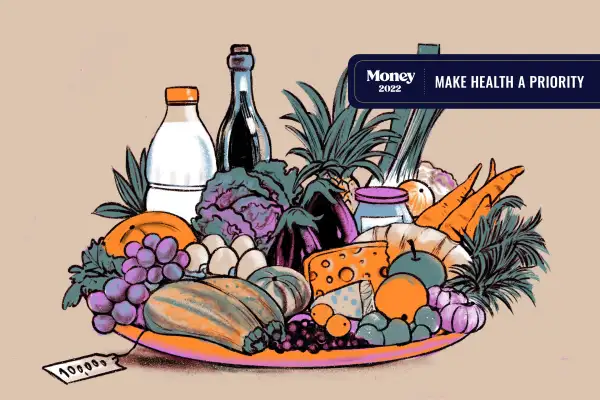How to Save Money on Groceries as Prices Keep Rising

This article is part of Money's January 2022 digital cover, which features 22 ways to make 2022 the best money year of your life. Browse all 22 articles here.
2021 wasn’t the best year for grocery shopping. Prices at grocery stores soared 6.4% compared to a year prior, recent data from the Bureau of Labor Statistics (BLS) shows. Meanwhile, household names like Coca-Cola, Nestle and General Mills announced price hikes on everything from Oreos to canned soup.
"It's about the entire supply chain,” says Phil Lempert, editor of SupermarketGuru.com.
Food manufacturers are facing higher shipping and storage costs, and an ongoing labor shortage is further delaying the time it takes to get groceries on store shelves.
The end result is rising prices, which Lempert predicts will last for another 12 to 18 months. In the meantime, here are five strategies to help you stay on budget in 2022:
Think about strategic swaps
When it comes to groceries, price increases aren’t equal across the board. Meat products have seen the most dramatic gouges by far, with the price of beef steaks up 26.4% on a yearly basis in November and the price of bacon up 21%. That means a single sirloin steak cost about $11.50 per pound last month, according to BLS data, compared to $8.80 per pound a year ago. Chicken prices are up 9.2%, while the price of frozen fruits and vegetables is up 2.8%.
If you want to spend less on your food bill, swap out your Sunday roast for a cheaper cut of meat or a plant-based meal. You can also switch to store brands rather than name brands. Or opt for frozen meat and fish, which is “Just as good and probably 30% to 40% less expensive,” Lempert says.
Don’t ignore in-store rewards programs
Think twice before you throw out that pamphlet stuck to the bottom of your grocery basket — the coupons inside could help you save some serious cash.
Some stores (like Trader Joe’s, Aldi and Lidl) are generally more affordable than others, so keep that in mind when you make your grocery list. Sites like Flipp and MyGroceryDeals.com can help you keep track of store-by-store promotions elsewhere.
And if your local supermarket has an app or loyalty program, make sure to sign up for it. Passing over those offers is like leaving free money on the table.
Don’t discount the dollar store
Dollar stores like Dollar Tree and Dollar General are becoming more and more upscale. Some even have fully-stocked produce sections, Lempert says.
These stores are able to sell items at lower prices than traditional grocery stores because they negotiate special deals on product sizing and labeling with manufacturers. But that model comes with a pitfall: If you see an item you like at a good price, you'll need to stock up right then. Dollar stores “buy opportunistically," Lempert says, so come tomorrow, that item might not be in stock.
Outsmart yourself
That old adage about not shopping hungry? It’s true. Research has shown that hungry grocery shoppers spend more money, so eat a snack before you head to the store.
Also, use a cart instead of a basket. One 2011 study found that shoppers who use a basket are more likely to make unnecessary (and unhealthy) purchases, since doing so puts you to reach items that give you instant gratification—think chocolate and candy—instead of sticking to your list.
Fire up that app
Ordering your groceries for pickup or delivery ahead of time is another great way to prevent impulse purchases. After all, it's pretty hard to toss a family-size ham into your cart on a whim if you’re not physically walking through the aisles. These days, there are more options for ordering online groceries than ever — from dedicated apps like Instacart and FreshDirect to curbside pickup offered by the supermarkets themselves.
Just be wary of in-app markups and fees: Prices on Instacart and other third-party apps are often higher than in-store prices, and these apps sometimes charge for delivery, too. So if you do use an app, it's a good idea to limit your orders to bulk buys, or opt for pickup instead of delivery to cut down on extra spending.
More from Money:
10 Items You Should Always Buy in Bulk
The Best Deals Around Are in Your Local ‘Buy Nothing’ Facebook Group
From Pet Nanny to Metaverse Real Estate Agent, These Side Hustles Scream '2022'
